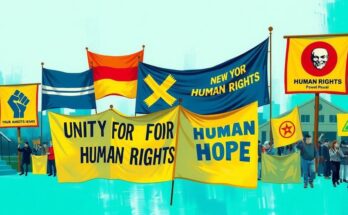Kurdish activist Verisheh Moradi, sentenced to death in Iran, is currently denied medical treatment, following a hunger strike that exacerbated her health conditions. Arrested for political activities, her trial was marred by lack of defense rights. The case illuminates ongoing human rights abuses in Iran, showcasing the regime’s ruthless suppression of dissent.
Kurdish activist Verisheh Moradi, sentenced to death by an Iranian court, has been inexplicably denied medical treatment following her conviction on November 8. Struggling with severe gastrointestinal issues after a 20-day hunger strike, Moradi’s planned transfer for medical care was blocked by Evin Prison officials, who cited her death sentence as grounds. Known for her activism, Moradi suffers from chronic pain and had her physiotherapy interrupted by her hunger strike. Arrested on August 1, 2023, Moradi endured intense pressure for forced confessions during her time in solitary confinement and was transferred to the women’s ward of Evin Prison only after five months. Her death penalty was delivered by judge Abolghassem Salavati, following court hearings that denied her the right to a proper defense and barred her legal team from reviewing critical case materials. This punitive ruling stands in stark contrast to an earlier indictment that suggested a maximum sentence of 15 years in prison, raising alarms about the fair administration of justice in Iran. On October 10, aligning with the World Day Against the Death Penalty, Moradi protested by going on hunger strike, a powerful act of defiance amidst her dire conditions. Despite a brief transfer to receive treatment for her digestive complications, she has faced a relentless series of restrictions, including no family visits since May 6. Moradi’s plight continues to shed light on the harsh realities faced by political activists in Iran.
The case of Verisheh Moradi highlights the ongoing human rights abuse and lack of judicial fairness within the Iranian legal system, particularly concerning political activists. Her death sentence, handed down under questionable judicial practices, emphasizes the severe repercussions faced by those who dare to challenge the regime. The denial of medical treatment and other privileges further underscores the punitive nature of her imprisonment, illustrating the broader climate of fear and oppression in Iran that stifles dissent and silences voices of change.
Verisheh Moradi’s case is a troubling reflection of the Iranian government’s stance on activism and dissent. Denied medical treatment post-conviction and subjected to significant legal injustices, her situation exemplifies the dire circumstances faced by many political prisoners. Moradi’s courage in the face of such adversity serves as a beacon for human rights advocacy and a call to the international community for intervention and awareness.
Original Source: kurdistanhumanrights.org



